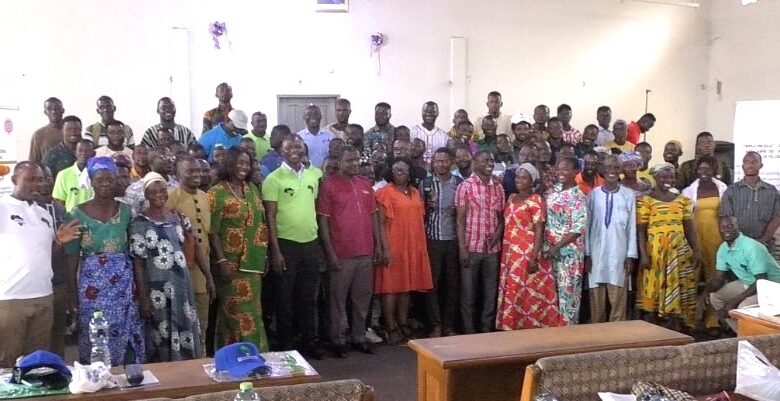Songotra T Cowpea introduced in Bono East to boost farm yields

A new high yielding insect resistance grain (Cowpea) developed by the Savanna Agricultural Research Institute (SARI), called Pod Borer Resistant Cowpea, also known as Songotra T cowpea has been introduced to farmers in the Bono East region.
Dr. Daniel Osei Ofosu, a Senior Research Scientist at Biotechnology and Nuclear Agriculture Research Institute of the Ghana Atomic Energy Commission, explained that the Pod Borer Resistant Cowpea, also known as Songotra T, is an improved variety of the conventional Songotra and Ghana’s first commercially approved Genetically modified organisms (GMO) which is yet to be put in the hands of cowpea farmers.
According to him, the seed is a product of modern biotechnology technique, which have been employed to increase its level of crop protection through the introduction of resistance against maruca vitrata which destroys the cowpea.
He explained that the technology enables scientists to edit the gene in the crop to enhance its traits including its resistance to pest, adverse environmental conditions such as drought and pest infestation.
Dr. Ofosu who is also country coordinator for the Program for Biosafety Systems (PBS), was speaking at a day’s workshop organized by the Ghana Chapter of the Open Forum for Agriculture Biotechnology (OFAB) in the Bono East Region of Ghana.
The workshop brought together over 100 farmers and journalist with the aim of providing them with a comprehensive understanding of the PBR cowpea technology, its potential advantages, and the role of biotechnology in addressing challenges facing the agricultural sector in Ghana and across the continent.
Dr. Ofosu pointed out that the technology could also help governments stabilize their Gross domestic product (GDP) as it would wean off the continent from its overreliance on imported food.
“Biotechnology offers innovative solutions to address various challenges facing agriculture, such as climate, pest and diseases” he said.
For her part, Executive Director for Media Platform on Environment and Climate Change, Mary Ama Kudom-Agyeman said cowpea is an essential commodity for Ghanaians and the release of the Pod Borer Resistant Cowpea, will help cowpea farmers in the Bono East Region increase their yields without spending much on pesticides.
The media consultant revealed that the improved Songotra T cowpea will be available in the market latest by 2025.
“Our farmers are really suffering, instead harvesting 10 to 15 bags of cowpea, they are only harvesting 2 or 3 bags as a result of the maruca infestation in their farms and that has make the prices of cowpea very high in the country, so our scientist from Ghana have done a lot of research and have come out with this improved Songotra T, which calls for celebration and applauds as an entry point to our numerous agriculture challenges in Ghana and Africa.
“The products are now with seed growers and companies and we believe that, this is the time to propagate this new product to our farmers and the country at large.
“It’s my wish that Songotra T cowpea will be on the market next year and that will help reduce the cost of cowpea in the market.” She said
Also sharing his views, Dawuda Mohammed, a cowpea farmer and Presiding Member of the Kintampo Municipal Assembly said that because of the huge devastation levels on their farms by the maruca vitrata during production, it has compelled all of them to rely heavily on pesticides to control the menace.
The situation, he said, was increasing cost of production and hence forced a lot of them to shift from beans production to other crops including moving from agriculture.
“We are patiently waiting for this new Songotra T cowpea which we have just learnt has the capacity to withstand the maruca vitrata; this is a welcoming news for us farmers and am very happy man today, am going back into beans cultivation once this seed hits the market.
“As we speak because of the huge devastation by maruca vitrata in our farms, we are only able to harvest 2 to 5 bags on an arc of land; that’s why a bag of beans is sold for GH₵ 3000.00 because of low yields and high demand for beans” he said.




